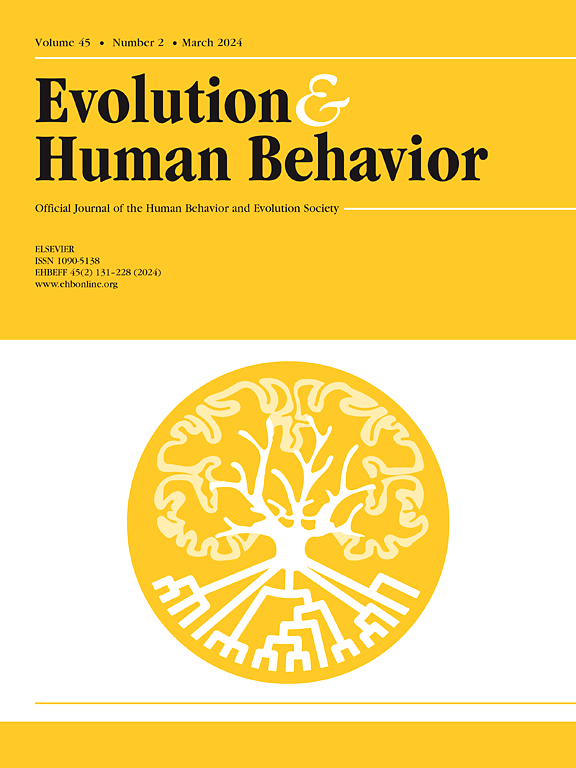The evolution of war and its cognitive foundations
IF 3.2
1区 心理学
Q1 BEHAVIORAL SCIENCES
引用次数: 0
Abstract
Coalitional aggression evolved because it allowed the participants to promote their fitness by gaining access to disputed, reproduction-enhancing resources that would otherwise be denied to them. Few species engage in coalitional aggression, even though the social conditions that would favor its evolution seem to be widespread. Why? Forming coalitions to exploit these opportunities requires individuals to solve highly complex and specialized information processing problems involving cooperation, coordination, and social exchange. The difficulty of evolving cognitive mechanisms capable of solving these problems—especially when the individuals involved are not kin—may explain why multi-individual coalitions are phylogenetically rare. We propose that humans and a few other cognitively pre-adapted species have evolved specialized cognitive programs that govern coalitional behavior, which constitute a distinctive coalitional psychology. To derive a preliminary map of this psychology, we started with a task analysis of the adaptive information-processing problems that arise during coalitional aggression. This exercise can shine light on our evolved psychology because algorithms that motivate and organize coalitional aggression would need design features that solve these problems well to be favored by selection. These problems include decisions about when to form a coalition or join one, when to initiate an attack, and how to allocate the costs and benefits that result from coalitional action. The risk contract of war identifies circumstances under which natural selection would favor decisions to initiate an attack. When the conditions of this model are met, mortality rates will not negatively impact the fitness of males in the winning coalition. This outcome has implications for the design of computational systems that motivate coalitional attacks; it may explain why warfare is so favored an activity among men, despite its risks to the participating individuals' welfare.
战争的演变及其认知基础
联盟侵略的进化是因为它允许参与者通过获得有争议的、增强繁殖能力的资源来提高他们的适应性,否则他们将被剥夺这些资源。很少有物种参与联合攻击,尽管有利于其进化的社会条件似乎很普遍。为什么?形成利用这些机会的联盟需要个体解决涉及合作、协调和社会交换的高度复杂和专业化的信息处理问题。进化出能够解决这些问题的认知机制的困难——尤其是当涉及的个体不是亲属的时候——可能解释了为什么多个体联盟在系统发育上是罕见的。我们认为人类和其他一些认知预适应的物种已经进化出专门的认知程序来管理联盟行为,这构成了一种独特的联盟心理。为了获得这种心理的初步图谱,我们从对联盟侵略期间出现的适应性信息处理问题的任务分析开始。这个练习可以照亮我们进化的心理,因为激励和组织联盟攻击的算法需要设计特征来很好地解决这些问题,以便得到选择的青睐。这些问题包括决定何时组建或加入一个联盟,何时发起攻击,以及如何分配联盟行动产生的成本和收益。战争风险契约确定了自然选择倾向于发起攻击的决定的情况。当该模型的条件满足时,死亡率不会对获胜联盟中雄性的适合度产生负面影响。这一结果对激发联合攻击的计算系统的设计具有启示意义;这或许可以解释为什么战争如此受到男性的青睐,尽管它对参与其中的个人的福利有风险。
本文章由计算机程序翻译,如有差异,请以英文原文为准。
求助全文
约1分钟内获得全文
求助全文
来源期刊

Evolution and Human Behavior
生物-行为科学
CiteScore
8.30
自引率
9.80%
发文量
62
审稿时长
82 days
期刊介绍:
Evolution and Human Behavior is an interdisciplinary journal, presenting research reports and theory in which evolutionary perspectives are brought to bear on the study of human behavior. It is primarily a scientific journal, but submissions from scholars in the humanities are also encouraged. Papers reporting on theoretical and empirical work on other species will be welcome if their relevance to the human animal is apparent.
 求助内容:
求助内容: 应助结果提醒方式:
应助结果提醒方式:


